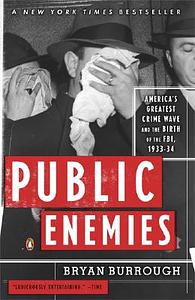Take a photo of a barcode or cover
81 reviews for:
Public Enemies: America's Greatest Crime Wave and the Birth of the Fbi, 1933-34
Bryan Burrough
81 reviews for:
Public Enemies: America's Greatest Crime Wave and the Birth of the Fbi, 1933-34
Bryan Burrough
slow-paced
was a bit slow at the start (first 100 pages or so) but really picked up by the middle and end! i enjoyed it thoroughly
adventurous
informative
tense
fast-paced
informative
I was really interested but after a while, it became a bit boring.
I'll be honest, maybe I just wasn't in the right frame of mind to read this but I just couldn't finish it. I haven't "given up" on a book in a long time, but I was deploring this book and it was turning into a chore to read.
It wasn't the subject matter that I had an issue with (I'm obsessed with the time period, and especially the Mafia and underworld.) There was just too many story lines going on at once; there were a few major ones like Dillinger and Bonnie/Clyde, but then there were minor ones you needed to keep on the back burner because it would pop back up from time to time. You had to remember every relative (from blood relative to brother-in-law of step-sisters) because at some point in time, someone would go back to their house to hideout. You had to remember every low-level FBI agent because they would all of sudden be in the forefront and called upon to chase someone down. It was too much to retain while keeping it interesting.
The other big issue I had was that the writing style was just too schizophrenic and all over the place. I felt like there was too much trying to be shoved into to small of a package. In a paragraph, it would go from bank robbery to store robbery to police chase to prison to escape to.. etc, etc. Then out of nowhere it would have one or two lines from someone talking. It felt like Burrough had a number of note cards with facts and purported conversations on them that he just shoved together into a paragraph. After awhile of reading, it turned from an interesting book into a college thesis history paper.
My final qualm with the writing was that I felt it was extremely opinionated. You could feel the author's emotions coming through in various points, like his obvious disdain for Bonnie and Clyde. I was reading this book for historical narrative, not for a psychological breakdown of Clyde's self-image issues.
Ultimately, I gave up about halfway through the book because I just didn't care anymore. Which is really really sad because I care a lot about the subject matter.
**Updated** I finished the book. I gave up on caring about the minor characters and pushed through. I still stand behind my earlier review though, and wouldn't suggest it to others.
It wasn't the subject matter that I had an issue with (I'm obsessed with the time period, and especially the Mafia and underworld.) There was just too many story lines going on at once; there were a few major ones like Dillinger and Bonnie/Clyde, but then there were minor ones you needed to keep on the back burner because it would pop back up from time to time. You had to remember every relative (from blood relative to brother-in-law of step-sisters) because at some point in time, someone would go back to their house to hideout. You had to remember every low-level FBI agent because they would all of sudden be in the forefront and called upon to chase someone down. It was too much to retain while keeping it interesting.
The other big issue I had was that the writing style was just too schizophrenic and all over the place. I felt like there was too much trying to be shoved into to small of a package. In a paragraph, it would go from bank robbery to store robbery to police chase to prison to escape to.. etc, etc. Then out of nowhere it would have one or two lines from someone talking. It felt like Burrough had a number of note cards with facts and purported conversations on them that he just shoved together into a paragraph. After awhile of reading, it turned from an interesting book into a college thesis history paper.
My final qualm with the writing was that I felt it was extremely opinionated. You could feel the author's emotions coming through in various points, like his obvious disdain for Bonnie and Clyde. I was reading this book for historical narrative, not for a psychological breakdown of Clyde's self-image issues.
Ultimately, I gave up about halfway through the book because I just didn't care anymore. Which is really really sad because I care a lot about the subject matter.
**Updated** I finished the book. I gave up on caring about the minor characters and pushed through. I still stand behind my earlier review though, and wouldn't suggest it to others.
This wasn't what I expected as a book from Bryan Burrough. Maybe it is because the previous work of his I read about he Civil unrest if the 60s was much better recorded and in depth. That might have made me think that this would be more than a simple recounting in a way. I was left feeling like this lacked depth and context that maybe I wanted or expected to get. It might not be the authors fault but this one didn't live up to my expectations.
adventurous
funny
informative
reflective
medium-paced
I picked it up because I saw the movie couple of weeks ago. The book's focus is on the rise of the FBI and how all these gangs were operating at the same time (often on the same days).
It's fascinating reading and amazing how bumbling the agents were back then compared to now. When I was watching the movie I thought it was a stretch that Dillinger would be able to walk into their HQ and talk to them without them noticing that their quarry walked right through their door, but it is totally understandable after reading the book. At the end I just sort of felt amazed that they were able to catch anyone within a reasonable time period.
It's fascinating reading and amazing how bumbling the agents were back then compared to now. When I was watching the movie I thought it was a stretch that Dillinger would be able to walk into their HQ and talk to them without them noticing that their quarry walked right through their door, but it is totally understandable after reading the book. At the end I just sort of felt amazed that they were able to catch anyone within a reasonable time period.
Well written and researched account of a fascinating period in American history. Burrough does a good job at following many different people and gangs without getting the reader lost. If you are interested in history or the time period, this book is recommended.





